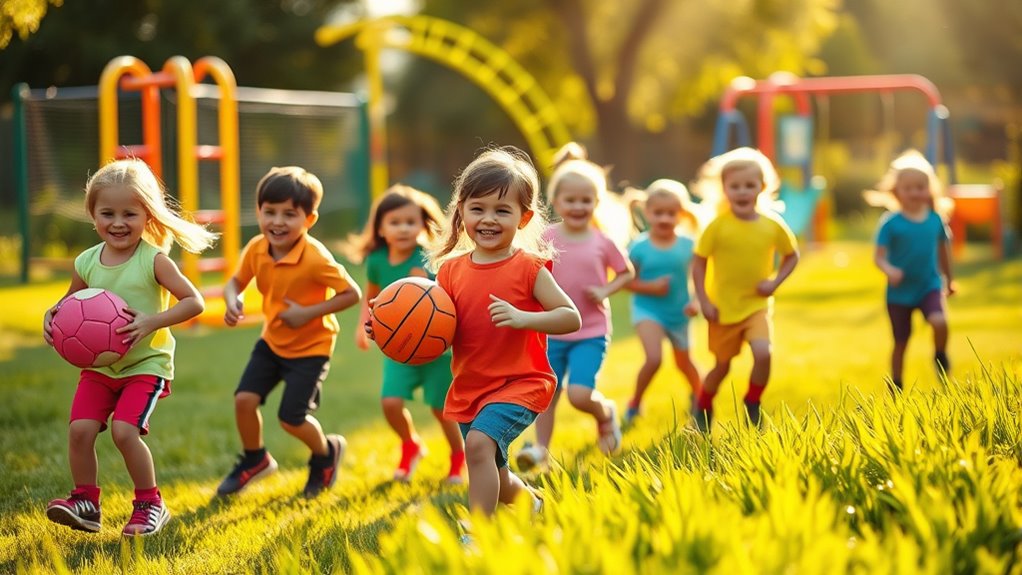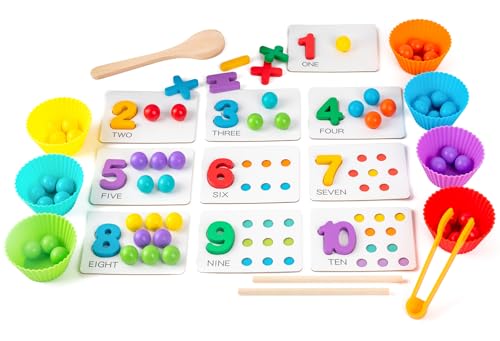Getting preschoolers involved in sports helps boost their motor skills, coordination, and confidence. It teaches them teamwork, sharing, and respecting rules, which are essential for social growth. Sports also instill values like perseverance, discipline, and resilience that benefit their personal development. Engaging in these activities lays a strong foundation for future physical and social success. Keep exploring to discover how sports can truly fuel your child’s growth and life skills.
Key Takeaways
- Sports activities develop preschoolers’ motor skills, coordination, and balance, laying a foundation for future physical development.
- Participation in sports boosts motivation, goal-setting, and perseverance, fostering a positive attitude toward physical activity.
- Team sports teach social skills like sharing, communication, patience, and cooperation, enhancing social confidence.
- Engaging in sports instills discipline, respect, and resilience, promoting personal growth and character development.
- Overall, sports support preschoolers’ holistic growth, confidence, and resilience beyond physical skills.

Have you ever wondered how participating in sports can boost your personal growth? When your preschooler gets involved in sports, they’re not just having fun—they’re building essential skills that will serve them for a lifetime. One of the most noticeable benefits is motor skill development. As they run, jump, catch, and throw, their coordination and balance improve. These activities help strengthen their muscles and refine their fine and gross motor skills, laying a foundation for future physical activities. Through consistent practice, they learn to control their movements better, which boosts confidence and encourages them to try new challenges. Plus, sports provide a dynamic environment where kids can learn about their bodies, how they move, and how to improve their physical abilities. Additionally, participation in sports has been linked to increased motivation and goal-setting skills, which are vital for lifelong success. But sports aren’t just about individual skills; they’re a powerful tool for teamwork building. When your child participates in team sports, they discover how to work with others towards a common goal. They learn to share, take turns, and communicate effectively—all crucial social skills. These experiences teach them patience and how to handle both success and disappointment gracefully. They see firsthand that collaboration and cooperation lead to better outcomes, which encourages a sense of belonging and community. Your child begins to understand that they’re part of a team, and their actions can influence the group’s success. This sense of shared responsibility can foster empathy and respect for others, laying the groundwork for healthy relationships as they grow. Participating in sports also helps children develop discipline and perseverance. They understand the importance of practicing regularly and pushing through challenges. These qualities transfer to other areas of life, such as academics and personal relationships. As they navigate wins and losses, they learn resilience and how to keep trying despite setbacks. Furthermore, the structured environment of sports teaches them about rules, fairness, and respecting authority figures like coaches. This respect for rules and authority can translate into better self-control and decision-making skills outside of the game. Ultimately, sports serve as a detailed platform for growth. They promote physical development through motor skills, cultivate social skills via teamwork building, and instill important life values like perseverance, discipline, and respect. As a parent or caregiver, encouraging your preschooler to participate in sports provides them with a fun, engaging way to develop holistically. It’s not just about winning games but about nurturing their overall personal growth, confidence, and resilience. Engaging in sports also offers opportunities for children to learn about sports industry dynamics, which can inspire future interests and aspirations. Through sports, you help lay a strong foundation that will support their development well beyond the playing field.

Get Outside Go! Easy Catch Ball & Glove Set Super Sport Outdoor Active Play Baseball by Toysmith (Packaging May Vary) Small
Easy Catch for Beginners: This toddler baseball glove with Velcro ball makes learning to catch fun and simple….
As an affiliate, we earn on qualifying purchases.
As an affiliate, we earn on qualifying purchases.
Frequently Asked Questions
How Does Sports Influence Preschoolers’ Emotional Development?
You can see that sports boost preschoolers’ emotional development by helping them build emotional resilience and improve social skills. When they play, they learn to handle wins and losses gracefully, which fosters emotional strength. Playing with others encourages sharing, cooperation, and communication, strengthening their social skills. These experiences teach preschoolers how to manage feelings, develop confidence, and form positive relationships, all essential for their emotional growth.
What Types of Sports Are Safest for Preschool Children?
You should choose sports like swimming, T-ball, or gentle yoga for preschoolers, as they’re generally safer. Always follow safety guidelines, such as appropriate equipment and supervised environments, to reduce risks. Your involvement is essential—stay attentive, encourage proper technique, and promote fun over competition. By combining these safety measures with your active participation, you help your child enjoy sports while minimizing potential injuries.
How Can Parents Encourage a Love for Sports Early On?
You can ignite a lifelong love for sports by turning every day into an adventure! Make playground safety your top priority, ensuring the equipment is perfect for tiny hands and feet. Play together often, introducing fun games that boost confidence and skills. Celebrate every small victory, and show enthusiasm for their efforts. When you create a safe, exciting environment filled with laughter and encouragement, you’ll inspire your preschooler to fall in love with sports forever!
What Role Do Teachers Play in Preschool Sports Activities?
As a teacher, you play a crucial role in preschool sports activities through active leadership and thoughtful activity planning. You create a safe, encouraging environment where kids feel confident to participate. By organizing age-appropriate games and demonstrating enthusiasm, you foster a love for sports early on. Your guidance helps children develop motor skills, teamwork, and self-esteem, laying a strong foundation for their ongoing physical growth and enjoyment of sports.
Are There Long-Term Benefits of Early Sports Participation?
Like planting a seed that grows into a sturdy tree, early sports participation offers lasting benefits. You’ll notice improved long-term health, as kids develop strong muscles and healthy habits early on. Additionally, children enhance their social skill development by learning teamwork and sharing. These early experiences set the foundation for a healthier, more confident future, making sports an essential part of preschoolers’ growth journey.

WECHARM KIDS Fine Motor Toys,Wooden Peg Board Bead Game for Toddlers – Rainbow Stacking, Color Sorting & Counting Toys | Fine Motor Skills Development | Math Learning Games for 3 4 5 Years Old
Rainbow Clip Beads Wooden Puzzle Board Game – a bright, engaging toddler toy with vibrant rainbow-colored wooden beads…
As an affiliate, we earn on qualifying purchases.
As an affiliate, we earn on qualifying purchases.
Conclusion
As you nurture your preschooler’s love for sports, you’re planting seeds of strength and resilience that will bloom for years to come. Think of sports as the gentle wind guiding a young sapling toward the sun, helping it grow sturdy and tall. Embrace every giggle, stumble, and victory as essential steps in their adventure. With each game played, you’re weaving a vibrant tapestry of confidence and health that will brighten their path through life’s playground.

ATHLOVA Kids Unisex Sports Vests – Scrimmage Mesh Practice Jerseys, 7v7 Soccer, Extra Small, 6 Red & 6 Neon Yellow
VERSATILE USE: Perfect for kids' sports activities, these scrimmage vests are ideal for soccer, flag football, and more….
As an affiliate, we earn on qualifying purchases.
As an affiliate, we earn on qualifying purchases.

makarci stepping stones for kids, 10pcs preschool toys promoting balance coordination skills indoor or outdoor play obstacle courses also autism sensory products for toddlers
EXTRA 10 PCS MAKE THE EVENT MORE FUN: Our colorful and gender neutral toddler stepping stones enhance your…
As an affiliate, we earn on qualifying purchases.
As an affiliate, we earn on qualifying purchases.









